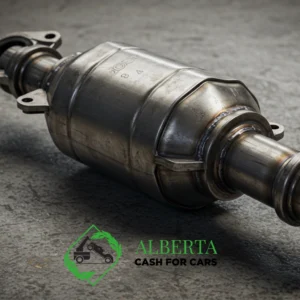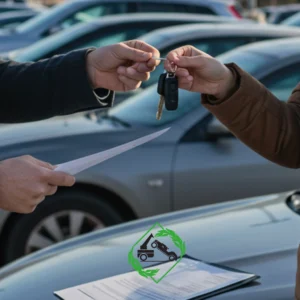Let’s face it, life throws curveballs. Sometimes, circumstances arise where you need to sell a car without the owner present. Maybe you’re helping a family member who’s out of the country, or perhaps you’ve inherited a vehicle and the paperwork is a bit complicated. Whatever the reason, it’s a situation that can feel a little daunting.
It’s not just about finding a buyer, though. It’s about navigating the legalities and ensuring everything is done correctly. Selling a car is a significant transaction, and doing it without the owner present adds an extra layer of complexity. So, let’s break down the steps and considerations involved in selling a car when the owner isn’t physically there.
No Hassle, Just Cash — Book Your Free Pickup or Quote Today!
The Power of Attorney | Your Key to the Transaction
The most common and legally sound way to sell a car without the owner present is through a Power of Attorney (POA). This crucial legal document grants you the authority to act on behalf of the owner, specifically including the power to sell their vehicle. It’s important to understand that there are different types of POAs, so ensure you obtain one that specifically grants you the power to sell a vehicle.
A “limited” POA can be used for a specific transaction, while a “general” POA grants broader authority. In most cases, a POA needs to be notarized to be considered valid, which involves signing the document in front of a notary public who verifies your identity and witnesses the signing.
The POA should also clearly state the details of the vehicle, such as the make, model, and VIN, and explicitly grant you the power to sell it. Obtaining a properly executed POA is the foundation of a smooth and legal sale when the owner isn’t physically present.

Gathering the Necessary Documents: Paperwork is Paramount
Just like any car sale, you’ll need to gather the necessary documents. This is crucial for a smooth transaction and to avoid any complications later on.
- Vehicle Title: The original title is essential. Make sure it’s in the owner’s name and free of any liens.
- Registration: The vehicle’s registration provides proof of ownership and is often required for the sale.
- Identification: You’ll need to provide your own identification, as well as the owner’s identification (if possible).
- Bill of Sale: A written bill of sale is necessary to document the transaction. It should include the names of the buyer and seller (acting on behalf of the owner), the vehicle details, the sale price, and the date of the sale.
- Odometer Disclosure: In most jurisdictions, you’ll need to complete an odometer disclosure form.
Having all the paperwork in order will make the selling process much easier and ensure a legal transfer of ownership.
Read Also: The Complete Guide to Paperwork Needed to Sell a Car | What You Need to Know
Finding a Buyer: Exploring Your Options
Just because the owner isn’t present doesn’t mean you can’t find a good buyer. You have several options to explore.
Private Sale: Reaching a Wide Audience
Taking the private sale route means you’ll be listing the car yourself, either online through platforms like Craigslist or Kijiji or in local classifieds. This approach can potentially yield a higher selling price, as you’re dealing directly with individual buyers. However, it also requires more effort on your part. You’ll need to write a compelling listing, take good photos, answer inquiries from potential buyers, and be prepared to show the car. It’s a hands-on approach that can be rewarding if you’re willing to put in the time and effort.
Dealership Trade-In: A Convenient Option, Especially for a New Purchase
If the owner is purchasing a new vehicle, trading in the old one at the dealership can be a convenient option. Dealerships will assess the value of the trade-in and apply it towards the purchase of the new car. While you might not get the absolute highest price compared to a private sale, the process is generally straightforward and saves you the hassle of finding a separate buyer. This can be a particularly good choice if speed and convenience are top priorities for the owner.
Cash for Cars Services: Quick and Hassle-Free
For a quick and convenient way to sell a car, especially when the owner isn’t present, consider cash for cars services. These companies specialize in buying vehicles in any condition and often offer a very straightforward process. They typically handle all the paperwork, making it a very hassle-free experience.
If you’re in Alberta and are looking for a quick and easy way to sell a car, even without the owner being there, reaching out to Cash for Cars Calgary could be a good option. We provide a transparent process and can handle the necessary documentation efficiently. This can be a great choice when speed and simplicity are paramount.
Consider the owner’s priorities (speed, price, convenience) when choosing a selling method.
Negotiating the Price: Getting the Best Deal
Negotiating the price is a key part of selling a car, and it’s essential to do your research to determine a fair market value for the vehicle. Check online resources and local listings to see what similar cars are selling for in your area. Be prepared for buyers to try to negotiate the price, so have a target price in mind, but also be willing to compromise to reach a mutually agreeable deal.
When negotiating, highlight the car’s strengths, emphasizing its features, overall condition, and any recent maintenance or upgrades. Negotiating effectively will ultimately help you get the best possible price for the vehicle, even when the owner isn’t present to do so themselves.

Completing the Sale: Ensuring a Smooth Transaction
Once you’ve agreed on a price, it’s time to complete the sale, and this is where attention to detail is crucial. Take the time to double-check all the paperwork to ensure everything is filled out correctly and accurately. When it comes to payment, ensure you receive it in a secure form, such as a certified check or bank transfer, to avoid any potential issues.
Finally, follow your local DMV’s specific guidelines for transferring ownership. This usually involves submitting the title, bill of sale, and other required documents. Completing the sale correctly is absolutely crucial for a smooth transaction and will help you avoid any complications or headaches down the road.
Notifying the Authorities: Tying Up Loose Ends
After the sale is complete, there are a few things you need to do to tie up loose ends.
- Notify the DMV: Inform your local DMV that the car has been sold.
- Cancel Insurance: Cancel the owner’s insurance policy on the vehicle.
- Remove License Plates: Remove the license plates from the car.
These steps will ensure that the owner is no longer responsible for the vehicle.
Handling Potential Challenges: Being Prepared
Selling a car without the owner present can present some unique challenges. Being prepared can help you navigate these situations.
- Title Issues: If there are any issues with the title (e.g., liens, errors), you’ll need to resolve them.
- Buyer Concerns: Some buyers may be hesitant to purchase a car when the owner isn’t present. Be prepared to address their concerns and provide documentation.
- Legal Requirements: Each jurisdiction has its own specific requirements for selling a car. Make sure you understand and comply with the local regulations.
Being prepared for potential challenges will help you handle them efficiently and effectively.
The Importance of Legality: Protecting Everyone Involved
Selling a car is a legal transaction, and doing it without the owner present requires extra care to ensure everything is done legally. As mentioned earlier, having a valid Power of Attorney is absolutely crucial. Additionally, ensure all paperwork is accurate and complete, leaving no room for errors or misunderstandings.
It’s also vital to follow all local regulations regarding the sale of a vehicle. Ensuring the legality of the transaction protects both the owner, whose interests you are representing, and the buyer, giving them confidence in the purchase. Taking these steps will help ensure a smooth and legally sound sale.
Final Words
Selling a car can be a complex process, and doing it without the owner present adds an extra layer of difficulty. However, by following these steps and being diligent, you can successfully sell a car without the owner present and provide peace of mind for everyone involved. Remember to prioritize communication, legality, and thoroughness throughout the process. With careful planning and execution, you can navigate this situation smoothly and achieve a successful outcome.







